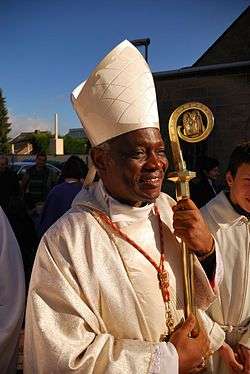Fante people
| |||||
| Total population | |||||
|---|---|---|---|---|---|
| (~3,000,000) | |||||
| Regions with significant populations | |||||
| Central region, Western region | |||||
| Languages | |||||
| Twi | |||||
| Religion | |||||
| Christianity, Akan religion, Islam | |||||
| Related ethnic groups | |||||
| Akan | |||||
Originally, Fante refers to tiny states within 50 miles radius of Mankessim. The states that made up the Fante were Kurantsi, Abura,[1] Anyan, Akumfi, Nsukum, Ejumako and Gomoa. The Mfantsefo or Fante (Fanti is an older spelling) are an Akan people. Fante subgroup is mainly gathered in the south-western coastal region of Ghana, with some also in Ivory Coast. Fante main city is Cape Coast, Central region. They are one of the Akan peoples, along with the "'Asantefo'" or Ashantis, the Akuapem, the Akyem, the Baoule, Guam, and others. Despite the rapid growth of the Ashanti Empire in historic times, the Fante have always retained their state to this day. Currently, they number about 2.5 million, the third largest grouping of Akan peoples. Inheritance and succession to public office among the Fanti are determined mostly by matrilineal descent, as is common among most Akan peoples.
When the Portuguese arrived in the 15th century, the Fante prevented them from venturing inland and leased properties for Portuguese trading missions. But when the Portuguese objected to Fante rules and regulations the Fante expelled them. Thenceforth the Dutch arrived, followed by the British. The Fante served as middlemen in the commerce between the interior and British and Dutch traders on the coast.
In the early 18th century, the Fante Confederacy was formed, with the aim of establishing themselves as a nation to be taken seriously by their European counterparts. So in 1844 a bond was written between the Fante, on behalf of the Gold Coast, and the British, allowing the Gold Coast to gain independence without war one hundred years later. Several Ashanti-Fante wars followed. On one occasion, the Fante were aided by the British, who, however, destroyed the strong Fante confederation established between 1868 and 1872, believing it a threat to their hegemony on the coast.
The Fante have produced numerous illustrious and prominent people, notable among whom are Kofi Annan (former UN Secretary General), British journalist and writer Ekow Eshun, Sam Jonah (ex-CEO of AngloGold Ashanti), John Atta Mills (Ghana's late former president), and a number of the advocates of independence, not only in Ghana but also in the West African sub-region, such as John Mensah Sarbah, James Kwegyir Aggrey and J. E. Casely Hayford.
Family Names
One of the social contexts of names among the Akan, and the Fante, for that matter is that they are used as social tags to indicate personal and group identity. This is so with family names derived from the patrilineal clans of the fathers that are given to children. Each of the twelve patrilineal clans has its peculiar family names. It is thus possible to use one’s name to trace his/her patrilineal clan. Children who trace their genealogy to one patrilineal father may therefore share similar family names.[2] Some typical family names include: Yankah, Osam, Aidoo etc. There have also been innovations as a result of westernisation, education and foreign religion. Multiple names have also developed out of this phenomenon. Also, some Fante names are translated literally into English and such anglicised names have come to stay as family names. One can argue that the Fantes living on the coast were the first to be in contact with the Europeans. It is therefore possible that the trend is a western influence. Examples of such anglicised transformational name are:
- Dua (lit tree/board) – Wood
- Kuntu (blanket ) – son of Kuntu Blankson
- Kumi ba ( child of Kumi) – Kumson or Koomson
- Kwei ba ( child of Kwei) – Quayson, Quayeson, Kweison or Kwaeson
- Akorɔma (hawk) – Hawkson
- Nyameba – Godson
- ɛbo (stone) – Rockson
Accordingly, some family names can also be identified by the suffix, for example:
- -son as in Yawson
- -ful, as in Arkorful,
- -ney, as in Biney.
Otherwise, Fante (Akan) typological family names indicate various contexts. They may be circumstantial, manner of birth, theophorous, weird names, insinuating and proverbial names, gang and nicknames, status, occupational, professional, religious, matrimonial, and western names. There can be a combination of two or more of these typological names.
See also
This article incorporates text from a publication now in the public domain: Wood, James, ed. (1907). "article name needed". The Nuttall Encyclopædia. London and New York: Frederick Warne.
References
- ↑ Facts On File, Incorporated (2009). Encyclopedia of the Peoples of Africa and the Middle East. Infobase Publishing. pp. 4–. ISBN 978-1-4381-2676-0.
- ↑ http://www.njas.helsinki.fi/pdf-files/vol15num2/agyekum.pdf


